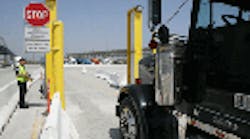Mexico has put tariffs of approximately $2.4 billion on about 90 U.S. goods from 40 states in a retaliatory measure after the U.S. ended the cross-border trucking program and prevented select Mexican trucks from operating beyond the U.S. border commercial zones, Bloomberg reported. While the Mexican government did not provide details, Bloomberg said the tariffs would include farm goods such as rice, beef, wheat and beans.
“We consider this action by the United States to be wrong, protectionist and clearly in violation of the treaty,” Mexico Economy Minister Gerardo Ruiz Mateos said in a statement.
However, President Obama said last week that his administration and Congress intended to work with the Mexican government to develop "a new trucking project that will meet the legitimate concerns" raised, according to the Associated Press. Press Secretary Robert Gibbs said during yesterday’s press briefing that despite the retaliation they still intend to work with Mexico to develop a new trucking program.
Mexico has put tariffs of approximately $2.4 billion on about 90 U.S. goods from 40 states in a retaliatory measure after the U.S. ended the cross-border trucking program and prevented select Mexican trucks from operating beyond the U.S. border commercial zones, Bloomberg reported. While the Mexican government did not provide details, Bloomberg said the tariffs would include farm goods such as rice, beef, wheat and beans.
“We consider this action by the United States to be wrong, protectionist and clearly in violation of the treaty,” Mexico Economy Minister Gerardo Ruiz Mateos said in a statement.
However, President Obama said last week that his administration and Congress intended to work with the Mexican government to develop "a new trucking project that will meet the legitimate concerns" raised, according to the Associated Press. Press Secretary Robert Gibbs said during yesterday’s press briefing that despite the retaliation they still intend to work with Mexico to develop a new trucking program.
“Today, Mexico announced its intent to take retaliatory actions against a range of U.S. exports,” Gibbs said. “This is in response to the termination of a cross-border, long-distance trucking demonstration project that allowed a small number of Mexican trucks to enter the United States beyond -- beyond the border commercial zones, and provided reciprocal access to U.S. companies in Mexico. The 2009 omnibus appropriations bill terminated the project. Congress has opposed the project in the past because of concerns about the process that led to the program's establishment and its operation.
“The administration recognizes these concerns,” Gibbs continued. “The President has tasked the Department of Transportation to work with the U.S. Trade Representative and the Dept. of State, along with leaders in Congress and Mexican officials, to propose legislation creating a new trucking project that will meet the legitimate concerns of Congress and our NAFTA commitments. Sen. Dorgan, the sponsor of the amendment that ended the program, has written to us to express his willingness to work with the administration in good faith to address this issue.”
A statement signed last year by 69 organizations, including the American Trucking Assns.(ATA), Caterpillar and the National Association of Manufacturers, noted that “if the pilot trucking program is blocked, we [would] expect Mexico to exercise its right to retaliate. Retaliation of this magnitude could wipe out a broad swath of U.S. exports to Mexico and related U.S. jobs.”
ATA vp of public affairs and press secretary Clayton Boyce told FleetOwner that there isn’t much to say until a new plan is in place. “The administration said they planned to come up with an alternative that would meet NAFTA requirements, so we are waiting to see what that is.”
The International Brotherhood of Teamsters, who opposed the Mexican cross-border program, said the threat is an “absurd overreaction” to the elimination of the program.
“The right response from Mexico would be to make sure its drivers and trucks are safe enough to use our highways without endangering our drivers,” said Teamsters general president Jim Hoffa. “The border must stay closed until Mexico holds up its end of the bargain. The U.S. needs to stop agreeing to trade deals like NAFTA that allow our own safety standards to deteriorate.”
According to IHS Global Insight Country Intelligence Service, the move is a diplomatic statement that will force President Obama to adopt a clearer stance on trade, noting that the issue will be high on U.S. Secretary of State Hillary Clinton's agenda when she visits Mexico next week.
“The sanctions threaten to have negative effects both for U.S. exporters and for Mexican consumers; hence the likely decision to avoid tariffs on more sensitive U.S. exports such as corn and wheat,” IHS said. “It remains to be seen how the United States responds—sufficiently emollient language could prompt the Mexican authorities to back down.”



